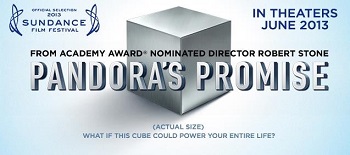‘Pandora’s Promise’ – A new documentary film on nuclear energy
As a nuclear engineer by education and someone whose family has worked in the nuclear energy field, I've never doubted the safe and environmentally-friendly electricity that nuclear energy provides. For those of us who have been advocates our entire lives, it is often difficult, however, to see why some people are afraid of and opposed to nuclear energy.
A new documentary provides a unique view of nuclear energy advocacy. Pandora's Promise illustrates the journey of several prominent environmentalists who have changed their views on nuclear energy. These environmentalists protested nuclear plants in the 1970s and '80s, but now speak in favor of nuclear energy as a "green" source of electricity. Their amazing stories can help those us in the nuclear field to understand why some people are opposed to nuclear energy-and how to try to change their minds.
I was fortunate enough to attend a screening of Pandora's Promise at the University of Chicago last month. While the event was open to the public, the audience consisted mainly of UChicago students and faculty, and scientists from Argonne National Laboratory (UChicago operates Argonne).
Academy Award-nominated director Robert Stone introduced the documentary and noted that it was "amazing to be here where nuclear power was born." Stone has been a life-long environmentalist who was formerly anti-nuclear, like many of those appearing in the film. His hopes for the documentary are to change the way that people think about nuclear energy and even have them question why they were against it in the first place.
Other environmentalists, authors, and journalists featured in this documentary include Gwyneth Cravens, Stewart Brand, Richard Rhodes, Michael Shellenberger, and Mark Lynas. Leonard J. Koch and Charles Till, who spent their careers at Argonne, were featured in the film as nuclear experts. See Argonne's IFR Plays A Role In Environmentalists' Support For Nuclear Energy and Reactors Designed By Argonne National Laboratory - Integral Fast Reactor.
The documentary begins with vivid scenes from protests of nuclear plants. The environmentalist cast members then individually take us through their journeys of how and why they changed their minds on nuclear, along with refuting some all-too-common misconceptions. There is also a great emphasis on the potential of fast reactors and the recycling of used fuel. Dynamic visual representations help explain complex technologies.
In my opinion, the most compelling part of the documentary is illustrating how those who actually protested against nuclear power have come to now speak in favor of it. Admitting you were wrong takes some humility and can even cost you your professional career. Michael Shellenberger, co-founder of The Breakthrough Institute, had always associated nuclear power with disaster, as Three Mile Island and Chernobyl happened when he was young. Stewart Brand was influential in persuading him to reevaluate and reconsider, but it was a slow process. Shellenberger states:
"The need for nuclear energy didn't land on me like a blinding insight, but rather kept gnawing at me from my peripheral vision. In the end the main reason I changed my mind was that I lost confidence that solar and wind could, on their own, power the world ... the things I associated with nuclear during my childhood were not so much replaced as outnumbered by the positive associations."
The documentary screening at UChicago was followed by a discussion featuring Hussein Khalil, director of the Nuclear Engineering Division at Argonne; Robert Rosner, professor of Astronomy & Astrophysics and Physics at UChicago; and Robert Stone, director of Pandora's Promise. The discussion involved questions from the moderator and audience. Most of the conversation was centered on the future of nuclear energy, including the potential of new reactor designs and grappling with the relatively high up-front cost of building new plants in the United States.
As a final and very important note, the speakers encouraged the audience to tell their friends about the movie, because public perception will ultimately drive the expansion or demise of nuclear energy in this country.
While Pandora's Promise is geared for a public audience unfamiliar with nuclear technology, I encourage all American Nuclear Society members to see the documentary to gain an understanding of why some people are against nuclear and what perspectives and facts proved most influential in their arriving at a different view. See it at select theaters nationwide starting June 12 and on CNN later this year. Please visit www.pandoraspromise.com for locations and more information.
Environmentalist bios
Gwyneth Cravens is a novelist, journalist, and magazine editor who protested the opening of the Shoreham nuclear plant in Long Island. A friend of hers from Sandia National Laboratories took her to nuclear facilities and their subsequent conversations made her change her views. Author of the landmark book The Power to Save the World: The Truth About Nuclear Energy, she is now a highly-regarded proponent of nuclear energy.
Stewart Brand founded the Whole Earth Catalog and is considered a giant in the American environmental movement. During a study on climate change he realized the potential of nuclear power as a greenhouse-gas-free source of electricity. In 2005, he became one of the first high-profile environmentalists to speak out in favor of nuclear energy as a means to combat climate change.
Richard Rhodes, whose bestselling book The Making of the Atomic Bomb won a Pulitzer Prize in Nonfiction, is a journalist and author who changed his mind after getting to know the scientists and engineers who developed nuclear technology. Rhodes gained a clearer understanding of nuclear power's potential with respect to other sources of electricity.
Michael Shellenberger is a leading environmental activist and co-founder of The Breakthrough Institute. Stewart Brand's book, Whole Earth Discipline, and TED talk in 2010 shocked Shellenberger by presenting the facts of radiation and ultimately changed his mind on nuclear.
Mark Lynas is a British author, journalist, and environmental activist who changed his mind in 2005 when he learned at a conference that nuclear energy was providing a sixth of world's electricity without emitting carbon, while wind and solar provided only a tiny fraction. Lynas has written influential books and served as an expert on climate change. He is currently writing a companion book to Pandora's Promise to be published later this year.
_______________________________

Kollar
Lenka Kollar is a nuclear engineer at Argonne National Laboratory and an active member of ANS, serving on the Nuclear Nonproliferation Technical Group Executive Committee, Student Sections Committee, and Professional Women in ANS Committee. She is an active participant in nuclear science outreach in the Chicago area and co-founder of the I'm a Nuke campaign.
Visit Lenka at www.lenkakollar.com and follow her on Twitter @lenkakollar. Lenka Kollar does not officially represent Argonne and all opinions are her own.



